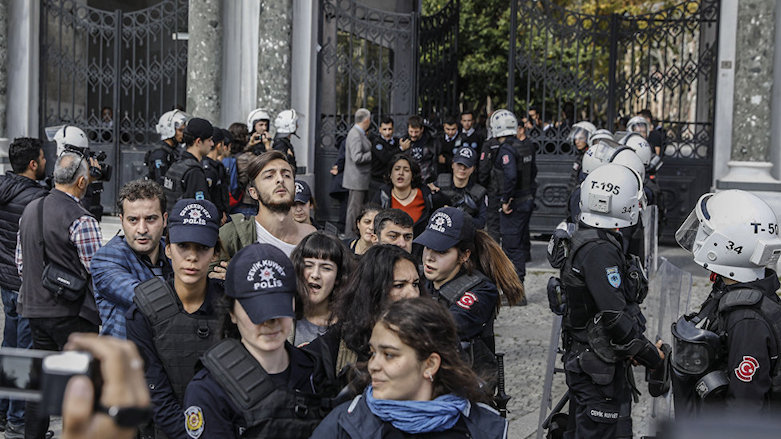Week of government wrath for intellectuals in Turkey

ERBIL (Kurdistan 24) - In a sign of Turkey's widening clampdown on the freedom of expression, the nation's judiciary handed down jail sentences this week to three prominent academics over speech which authorities characterized as "propaganda for terrorism."
Political scientist Koray Caliskan, historian Ayse Hur, and theologian Ihsan Eliacik found themselves targets of Istanbul prosecutors for statements made in previous years.
This occurred just after the country's strongman president Recep Tayyip Erdogan announced snap elections, to be held in two months.
On Thursday, Caliskan received a sentence of 18 months and 22 days in prison on charges of “disseminating propaganda for an armed terrorist organization” by Istanbul's 24th Penal Court.
Remarks he made on political talk shows had led to his arrest alongside that of 63 other academics in late 2017.
The academics, like thousands of others, were accused of being members of, or collaborating with, the movement of the US self-exiled Islamic clerics Fethullah Gulen, a group the Erdogan administration holds responsible for a failed 2016 coup attempt.
Caliskan is an associate professor at Bogazici University, a leading English-language, American-style college in Istanbul acclaimed for its liberal atmosphere and relative independence from state interference.
That autonomy has eroded in the past several years with President Erdogan denouncing the school and staff for, in his words, "not committing to the values of the homeland and nation."
In the past month, the university has seen a wave of police raids.
Eleven students were detained for protesting Turkey's invasion of the Afrin canton in Syrian Kurdistan to dislodge the US-backed Kurdish People's Protection Units (YPG). Though the YPG has been a critical ally of Western countries in defeating the Islamic State (IS), Ankara views it as an extension of the outlawed Kurdistan Workers’ Party (PKK).
The case of Ayse Hur, a history columnist known for her work on the early 20th-century Armenian Genocide by the Ottoman Turks and successive governments' oppression of minorities, is an example of ever-expanding state scrutiny of social media that has led to thousands of arrests.
"I have repeatedly stated that the PKK is not a terrorist organization but rather a people's/guerrilla movement that commonly resorts to terror acts," she had written on Twitter in a post now unavailable.

Hur's designation of some of the group's attacks as ones of terror was not enough to save her from jail time. The same Istanbul court that convicted Caliskan sentenced her to 15 months of imprisonment.
Their punishments were suspended under supervised release with the condition of not committing a similar crime for five years.
The harshest ruling was given to Ihsan Eliacik, a fierce critic of the present Islamist-rooted government and himself a Turkish scholar of Islam who advocates a theology centered on left-wing beliefs and social justice.
Views he expressed at a 2014 summit of prominent Islamic scholars promoting the then-ongoing peace talks between the PKK and Turkey in the Kurdish city of Diyarbakir led to a sentence of six years and three months in prison.
Eliacik, too, was spared from serving time. He was, though, barred not only from leaving the country, but also from traveling outside the provincial borders of Istanbul, with a requirement to report in person twice a week to local security forces.
Not everyone targeted by the state for voicing ideas was that lucky.
On Friday, primary school teacher, Ayse Celik, convicted last year of "praising terrorism" was sent to prison in Diyarbakir.
Celik's crime was to join a popular talk show on television in January 2016, at the height of a Turkish army offensive on several Kurdish cities where PKK-affiliated armed youth groups, claiming autonomy, were trenched.
Complaining about the collapse of peace negotiations between the Kurdish rebels and Ankara, she had urged the public not to "remain silent to the sound of bombs and bullets."
"Do not let children die; do not let mothers weep," Celik said during her participation in a program aired on a privately-owned national channel via telephone.
As the week ended, she handed herself in to authorities who locked her behind bars for the next year and three months in Diyarbakir.
Accompanying Celik was her eight-month-old baby.
Editing by John J. Catherine

